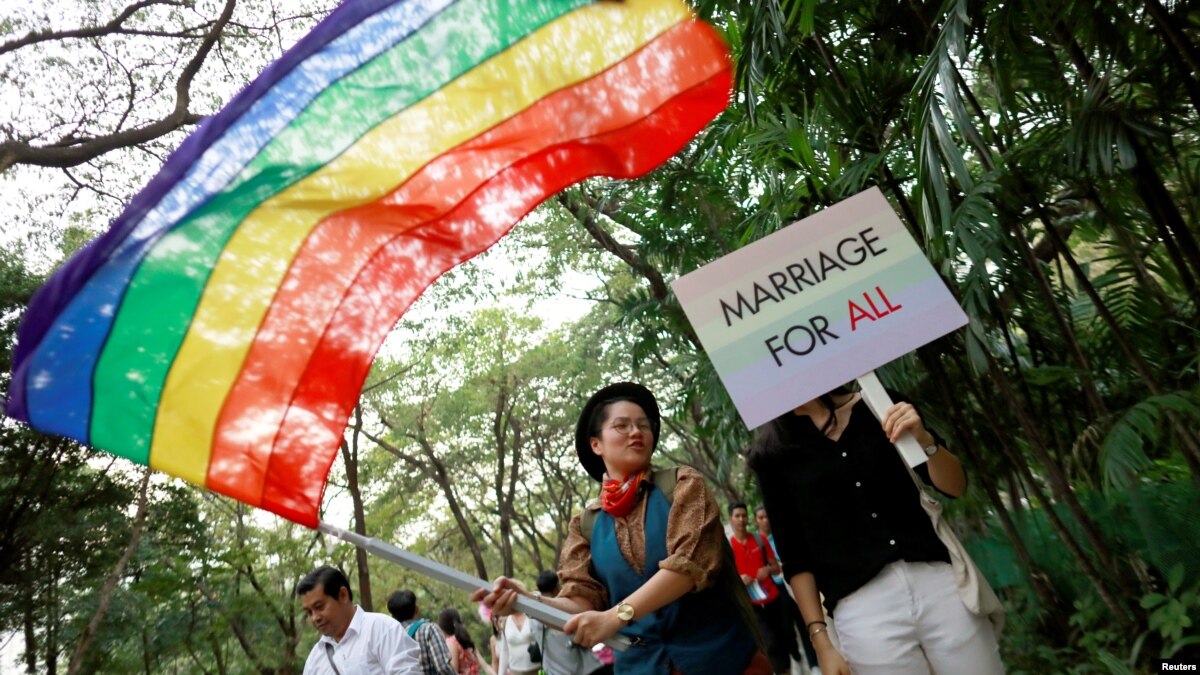
Thailand’s government is considering a proposed Life Partnership Bill, which would guarantee same-sex couples rights similar to couples in traditional marriages, including the use of one’s spouse’s surname, property rights and the right to end the partnership.
The move is seen as a milestone in efforts to improve legal rights for those in the Lesbian, Gay, Bisexual and Transgender, or LGBT, community, which comprises an estimated 8 percent of the population, or about 6 million people.
For hotel receptionist Patipant Chuthapun, who lives with his partner in the northern city of Chiang Mai, the proposed partnership law is a welcome one.
In the lobby of the boutique Isty hotel in the city’s urban core, the 23-year-old worker feels most at ease with his sexual identity, while he can openly greet foreign tourists, including gay and lesbian travelers.
“At first, when I worked at the hotel, I felt like I had to hide my identity because I wasn’t sure if the guests would look down at me. But they seem to be more open and accepting to the way I am,” he said.
What was more challenging to Chuthapun was telling his parents about his sexuality when he was a teenager going to school in the conservative farming community, where more than 90 percent of Thais practice the conservative Theravada Buddhism.
“We have problems with the family, and they don’t accept who we are because Thailand is not as open as Western countries,” said Chuthapun.
“Now, we have the law, and our families have heard about it and they are starting to open their hearts for us.”
Current marriage laws reflect a traditional interpretation of gender and family arrangement with reference specifically to men and women.
LGBT groups have been holding public hearings and rallies at major centers across the country, ahead of a government decision on whether to have the new civil partnership bill go before a legislative assembly this year.
WATCH: LGBT rights
The bill was first drafted in February 2013, but proceedings were sidelined a year later, after a May 2014 coup and subsequent government reshuffle.
Now, the renewed hearings have caught the attention of many in the LGBT community, including Patawee Triwijan, a resort worker and Chuthapun's live-in boyfriend.
“In the past when we first lived together, we had to pretend to be like others and say that we were just friends. So, when we went out in public, we didn’t dare to hold our hands to show our affection,” said Triwijan, as he monitored a popular LGBT website for updates on the proposed law.
“Things are changing now because we have more support. and we aren’t afraid to hold our hands in public,” Triwijan added with a smile.
At the Chiang Mai Rights and Liberties Protection Department, the staff is busy compiling recommendations gathered from hearings in the northern regions of Thailand.
“We opened the public hearing stage for every group, for LGBTs and for the government that has to implement this law if it is passed,” said Director General Phuchit Jaruwat.
“We discussed the challenges and limitations that this will have — if passed — and open up to opinions of what we need to make the law work best in our society.”
“Thailand wants to have the same standard of rights for the LGBT community so that all members of society have the same status.”
Gay rights groups say the bill is a positive step but that they will continue to push, hoping that the measure is a sign of more rights to follow.
“Thailand looks a lot like a paradise for the LGBT community but in reality, we don’t have any written laws or regulations to support our community. So, we are faced with many problems in Thai society that we need to fix,” said Ratthawit Apiputthiphan, director of Mplus, an aid group for the LGBT community.
Aside from the stated benefits, the act raises the age of legal consent from 17 to 20 and does not include joint adoption or parental rights.
“For the latest same-sex marriage law, they need more adjustments and changes to make it more complete for the LGBT group,”Apiputthiphan adds.
“For example, when a partner gets sick, we can sign the documents for his treatment and for adoption, to allow us to adopt children.”
“We want to have all equal rights, the same treatment as ordinary men and women. It seems like they have this law just to label us.”
A 2014 country report that was reviewed by USAID and the United Nations Development Program, or UNDP, noted that in Thailand's southern provinces, where followers of Islam largely congregated, attitudes toward the LGBT community were more conservative and unfavorable. The document, Being LGBT in Asia: Thailand Country Report, also said, "Legal and policy reform is seen as difficult both because lawmakers tend to be conservative and, because the constitution and country's laws are seen as sacred." (It noted the opinions did not reflect the official policy positions of USAID or UNDP).
Although the date for the vote is still unconfirmed, Gen. Phuchit Jaruwat, the rights and liberties protection director, said, "We hope to have the bill finalized and for a vote before the end of the year." If the law passes by then, Thailand will be the first country in Asia to fully legalize country-wide same-sex unions.
Read More Thailand Considers Same-Sex Partnership Bill : https://ift.tt/2EgUQfR
No comments:
Post a Comment